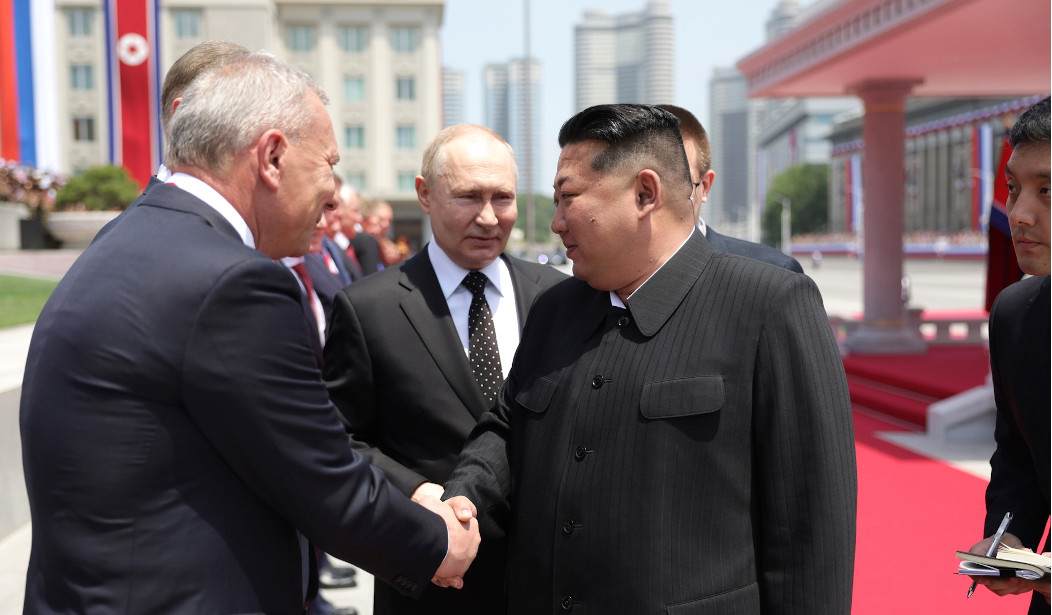China and North Korea have several things in common, not the least of which is that they are both Communist countries. Granted, China allows some free-market activity, as without it, its economy would collapse. North Korea remains as it has been, a Stalinist dictatorship run by a stunted little gargoyle with bad hair from a long line of stunted little gargoyles with bad hair.
The other thing they have in common is that both nations are big on appearances, but not always so big on substance. However, in both cases, everything they do is done for a reason, which is something one should keep in mind when examining the news that emanates from both places.
Case in point: North Korea has built, on its east coast, an honest-to-gosh beach resort. Now, we can note that the regular people of North Korea are eating grass, clay, bones, and dead birds to stay alive while their Dear Leader is building resorts, and this resort doesn't have many visitors.
Miles of white sand, turquoise waters, and rows of pristine beachfront hotels line the shore at the newly built Wonsan-Kalma resort. North Korean leader Kim Jong Un hopes the development will be his country’s answer to Waikiki.
But there’s one problem: the tourists aren’t there.
When CNN reviewed footage from the resort, which opened in June, only a handful of Russians could be seen on the vast stretches of beach. The rest of the area appeared empty.
“There are no other foreigners apart from us, 15 people,” said Darya Zubkova, a 34-year-old veterinarian from St. Petersburg, Russia.
Russians. How interesting. Why would Russians be vacationing in North Korea?
North Korea has been a (troublesome) puppet state for China since not long after the Korean Peninsula was divvied up at the end of World War 2. During that war, Japan had occupied Korea; after the fighting ended, Korea was split into the American sector, which became South Korea, while the northern Soviet zone became North Korea, also known as the "Democratic People's Republic of Korea," which is three lies for the price of one. Since the 1950-1953 Korean War, the Norks have looked to Beijing more than Moscow.
The troubling thing here is that the new Axis of Evil, the alliance of not only Russia, China, and North Korea but also Iran, is tightening. In recent days, a summit of the leaders of these nations was held in Beijing, hosted by Chairman Xi, and reportedly attended by Russia's President Putin, North Korea's leader Kim Jong-un, and Iran's President Ebrahim Raisi. China has marked the event with a showcase of military might.
For the last three days, Xi Jinping has played host in one of China’s busiest port cities, welcoming leaders from across Asia and the Middle East for a carefully choreographed summit designed to showcase his vision of a new world order.
Now, the Chinese leader is set to exhibit a very different image with an ostentatious show of military might.
On Wednesday, he will commandeer Beijing’s main artery – the Avenue of Eternal Peace – for a major military parade showing off the country’s cutting-edge hypersonic weapons, nuclear-capable missiles, and undersea drones, alongside thousands of goose-stepping soldiers.
Of the four nations assembled for this display, three are nuclear powers, and one has ambitions to become so. That's significant, because in international affairs, nations with nuclear arsenals are far more complex for other nations to deal with. International diplomacy is so often, as the old saying goes, a case of saying "nice doggy, nice doggy" until one can find a rock, but nuclear-equipped nations are much bigger, meaner doggies with sharper teeth. Russia, China, and North Korea are aware of this. Iran is trying to find out.
Hitting that message home is Xi’s guest list for the gathering, a cohort of more than two dozen China-friendly world leaders topped by Russian President Vladimir Putin and North Korean leader Kim Jong Un, which also includes Iranian President Masoud Pezeshkian.
That also makes the first time that the leaders of a quartet of nations Washington strategists warn are converging to form an anti-American “axis of upheaval” will be together in one event.
Granted, Iran's President Pezeshkian can't blow his nose without the permission of the mullahs who really run that country, but we might note that the mullahs are almost certainly united in their hatred for the United States and their hunger for Iranian nuclear weapons. And does anyone think that North Korea would hesitate to sell them one?
Read More: Attention Washington: South Korea Is Undergoing an Alarming Anti-US, Pro-CCP Drift
Here's the thing: None of these nations, yet, could take on the United States in a major war and win. Oh, they could initiate a full-scale nuclear exchange, in which nobody would win except rats and cockroaches. But in a more or less conventional war, the USA still has the edge. But if all of them combined?
Bear in mind also the recent efforts by Chinese nationals to smuggle biological materials into the United States.
Read More: Chinese National Nabbed by DOJ for Allegedly Smuggling in Biological Material—and She's From Wuhan
They Haven't Stopped: Chinese Students Attempted to Smuggle Agricultural Bioweapon Into US
Things may become very, very interesting in the next few years. North Korea, Russia, China, and Iran are certainly getting very cozy, to the point where North Korea is building seaside resorts for Russian clients. China has been dialing in its navy. And Iran? We hit their nuclear program very hard indeed, but the mullahs aren't done hating America yet.
Any major attempt on the United States won't be another Pearl Harbor. It won't be a massive air or combined-arms attack by a conventional army or armies. It will likely come from within the United States. It will be a multi-pronged attack, likely incorporating AI, autonomous drones, and biological agents. It will be aimed, first at our infrastructure, then at our government at all levels, and then at our citizens. Bear in mind one other thing: For four years, under the presidency of "Autopen Joe" Biden, millions of people poured into the United States illegally, unscreened, unvetted, many of them young, fighting-age men, some we know from Russia, China, and Iran. And even now, we don't know where many of them are or what they may be doing.
All this is, granted, a somewhat-educated guess on my part, but I think it's a pretty solid one.
This has to make one wonder just what is being discussed in Beijing this week.















